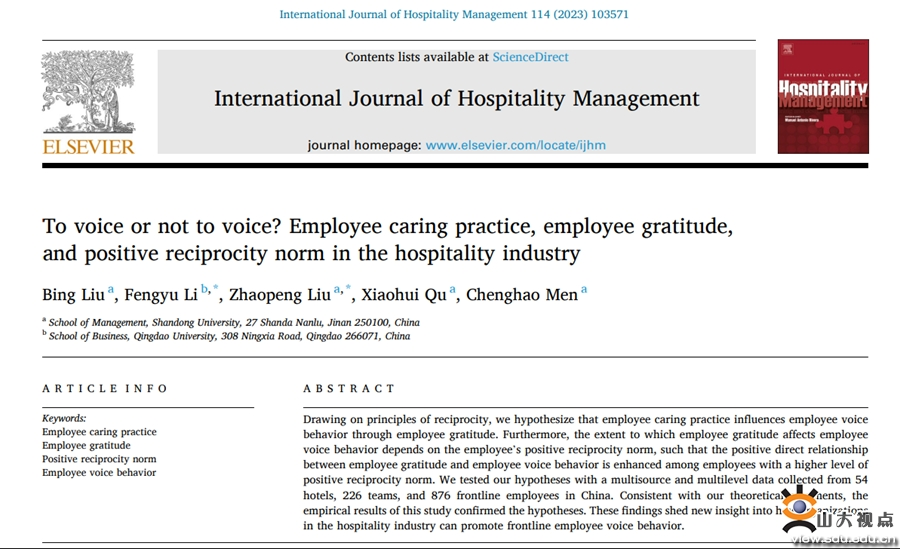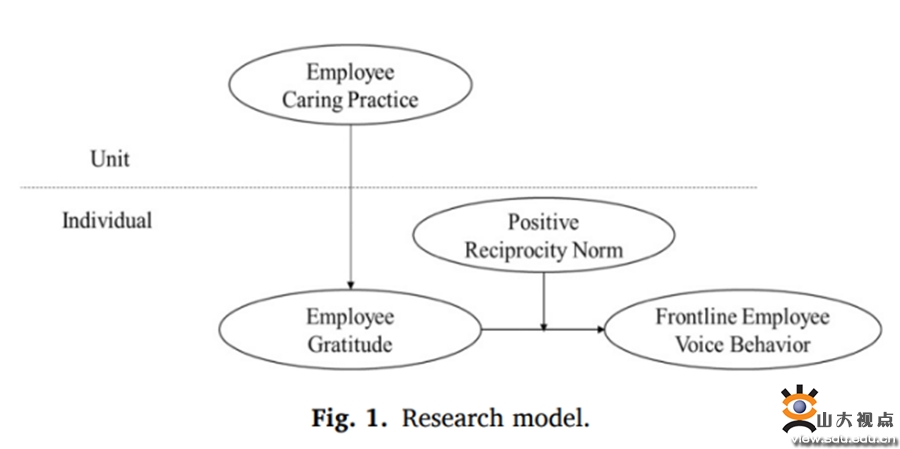Recently, Professor Liu Bing’s team from the School of Management published their latest research result “To voice or not to voice? Employee caring practice, employee gratitude, and positive reciprocity norm in the hospitality industry” in the International Journal of Hospitality Management (IJHM). Professor Liu Bing was the first author of the paper, PhD graduate Li Fengyu was the second and corresponding author, Associate Professor Liu Zhaopeng was the third and corresponding author, Master’s graduate Qu Xiaohui was the fourth author, and Associate Professor Men Chenghao was the fifth author.

To Voice or Not to Voice? In the service industry, it seems to be a common phenomenon that service personnel have opinions and do not voice. However, service workers work around customers and are in a key position to identify service problems and organizational development opportunities, so their voice behaviors usually have a great impact on workflow and service effectiveness. As a result, service organizations are eager to encourage employees to voice their opinions and provide them with a safe atmosphere and open channels to do so. However, many employees are reluctant to the principle of “voicing less is better than more”. So what can companies do to encourage service employees to voice? The existing research on the antecedents of voice behavior focuses on leadership and employee traits, and these researches have fully explored what kind of leaders make employees feel safe to voice their opinions, and have identified what kind of employees will actively voice their opinions. For the service industry, where turnover is particularly high and service staff shortages are frequent, a long-term stable HRM practice is particularly important. HRM practices, as an effective management policy, not only have a long-lasting impact on leaders and employees but have also been shown to have a significant impact on employee behavioral motivation. Unfortunately, little is known about the impact of HRM in the service sector on frontline employee voice behavior. In particular, under the talent strategy, organizations have begun to implement employee caring practices, but their positive effects have rarely been explored. Therefore, based on a motivational perspective, the research examines whether employee caring practices can sustainably stimulate employees’ willingness to voice, thus making them willing to do so proactively.

The research conducts large-scale research with 876 frontline employees in 54 hotels. The research found that when companies care about employees’ work stress, physical and mental health, and work-family balance, i.e. when organizations implement employee caring practices, employee gratitude to their organizations appears. According to the positive reciprocity norm in social exchange theory, employees will actively voice to the organization out of the employee gratitude. Moreover, the stronger the employees’ positive reciprocity beliefs are, the stronger the employee gratitude will be for the organization’s caring practices, and the more urgent the employees’ desire to return the favor, and accordingly, they will be more willing to voice their problems and ideas to the organization, to seek mutual benefits and common development with the organization. The results of the research not only further elucidate the question of “how to promote service employees to voice” and clarify the role of employee caring practices as an institution to promote employees’ voice behavior, but also reveal for the first time the mediating role of employee gratitude, which shifts the existing research perspective from cognitive mechanisms to emotional mechanisms. In addition, the research identifies the role of positive reciprocity beliefs in enhancing the positive effects of employee gratitude, which remedies the lack of research on the boundary conditions of the positive effects of employee gratitude. In terms of corporate practice, the research affirms the positive role of employee caring practices, encouraging managers to exchange sincerity, focusing on both employee performance and the physical and mental health of employees, so as to reach a long-term reciprocal positive relationship with employees. At the same time, the research also reminds managers to pay attention to the frontline employee voice behaviors and try to maintain employee gratitude to prevent frontline service workers from becoming the silent ones in the organization again.
IJHM is an internationally important journal in management with an impact factor of 11.7 in 2022 and is a TOP journal in JCR I and CAS I. It is dedicated to publishing the latest research results related to the fields of hotel human resource management, consumer behavior and marketing, tourism policy, etc.
Liu Bing is a professor at the School of Management, Shandong University, whose main research interests include service innovation, platform organization management, and flexible human resource management. He has published more than 40 papers in journals such as the Journal of Applied Psychology, Tourism Management, International Journal of Hospitality Management, Nankai Business Review, China Soft Science, and Journal of Management Science. He is the chairperson of the General Program “Research on Innovation Capability of Platform Organizations: Based on the Perspective of Flexible Human Resource Management” of the National Natural Science Foundation of China.
Li Fengyu is a PhD graduate of the School, and an associate professor of Business College, Qingdao University. His main research interests include human resource management, service innovation, and work reshaping. He has published many papers in Tourism Management, International Journal of Hospitality Management, Asia Pacific Journal of Human Resources, Chinese Journal of Management, Dongyue Tribune, and other journals.
Liu Zhaopeng is an Associate Professor at the School with main research interests in employee behavioral ethics, new employee socialization, and pro-social motivation. He has won the 2020 Best Paper Award in the OB Group of the Academy of Management, the 2019 Best International Paper Award of the Society for Industrial and Organizational Psychology, and one of the 2019 Best Papers of the Academy of Management, and has published papers in Journal of Organizational Behavior, Computers in Human Behavior, International Journal of Hospitality Management, and other journals.
Men Chenghao is the Associate Professor of the School. His main research interests are leadership, knowledge management, and creativity and innovation. He has published many papers in the Journal of Business Ethics, Journal of Creative Behavior, Management Decision, Journal of Knowledge Management, and other management journals. He presided over the General Program “Research on the Mechanism and Countermeasures of Socially Responsible Human Resource Management for Driving Dual Green Innovation in Enterprises” of the National Social Science Funds of China.
Link: https://doi.org/10.1016/j.ijhm.2023.103571